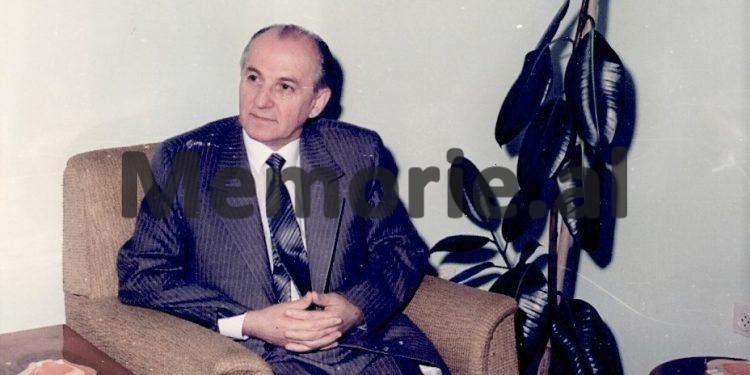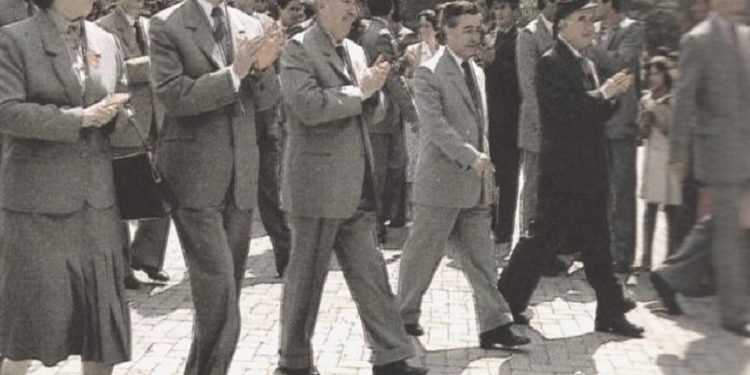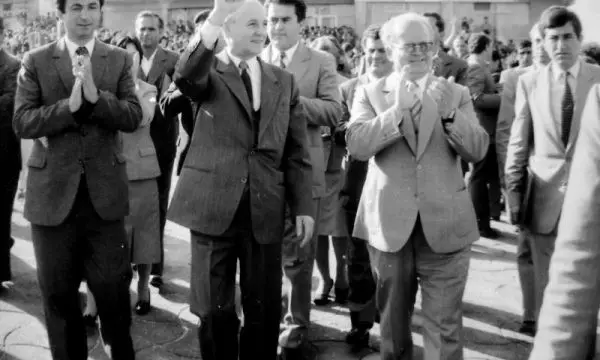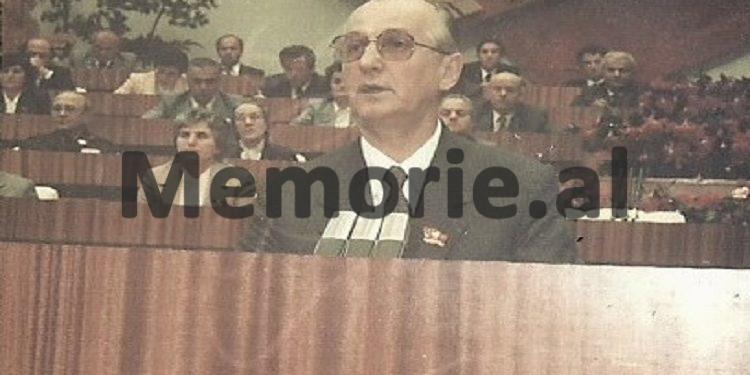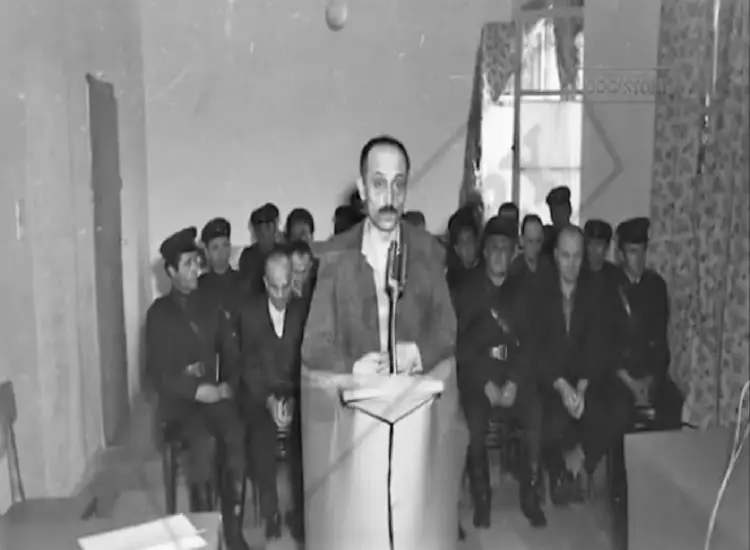Part Three
Memorie.al / “If Mehmet had been like this from 1942-43, when he was in a concentration camp, until 1981, when he committed suicide, they say 40 years. What did he wait for? He was at the head of the country. If he had been an agent of the Americans or the English, what did they want more to ruin Albania?! Mehmet would have acted”! In a long story given years ago to the magazine “ABC”, former president Ramiz Alia, has told his life and confidential reports in the dome of the communist state. He has spoken for the first time about the clashes in the Central Committee and what happened a few minutes after the death of the former iron prime minister, Mehmet Shehu!.
There, Alia also recounts his relations with former Prime Minister Shehu, which he describes as correct, but not cold. However, it is stated that Mehmet wanted to implicate him in the Todi Lubonja case. But the surprising statement in this interview is that Mehmet Shehu was not an agent. According to Alia, if he was an agent, from the time he was in the concentration camp until 1981, when he committed suicide, he would have been able to act within such a long time, 40 years, especially since an agent like Mehmet Shehu would have been enough for the Americans and the English to overthrow the communist regime in Albania.
Continued from the previous issue
Mr. Alia, when did the Party find out?
R. Alia: I don’t know how to explain anything about that phenomenon, I only know that those people were taken as soldiers, but also suspected of being people who had been collaborators with the invaders.
Under the pretext that to take them to their divisions, it was easier for them to pass through Montenegro and further, to join the forces, they took them and massacred them. So, the Yugoslav plan was practically to kill these people who were called collaborators. It is similar to what Zerva did with the Chams. Zerva killed as many as he wanted there. And 30 thousand other Chams, he escorted them, took them out of the border, brought them to Albania, that is, and expelled them from their lands.
Do the Albanian communists feel some kind of remorse for this fact that they ignored this…?
R. Alia: The Albanian communists could not do anything at that time. I heard at a scientific conference a speaker who calls himself a scientist who said; “Our divisions should have stayed in Kosovo and kept Kosovo united with Albania”. Now such people, as far as I know, are like those little toads when they fight wars and can say such a thing, if you think seriously, a mature man who calls himself a “professor”, when he says that a division consisting of 5,000 people should have stayed in Kosovo and said that Kosovo is ours, without taking anything into account.
Nor international norms. We must not forget that there were some international norms at that time, such as the Atlantic Charter. But, secondly, in front of a force like that of Yugoslavia, which in the war against fascism, after the allies France and England, in Europe I mean, Yugoslavia would have come and for our division to stay and “occupy” Kosovo, it was impossible. These are fairy tales and absurdities.
As for Kosovo, has anyone raised their voice?
R. Alia: A voice has been raised, what you have to do with it. The point is here, you have read, Enver Hoxha wrote about the meeting he had with Tito, he raised the problem of Kosovo, since that time. Tito told him; this problem must be addressed, but we, he said, cannot now because it would create problems for us with the Serbs, etc., and left it to be addressed later. These were problems that could be discussed between the allies, as is discussed today between the allies. There are many problems today that are discussed and closed. Today the American says to the EU, the OSCE and; as you order, it is done.
Well, you called them Yugoslavs; as you order?
R. Alia: Yes, of course. The Yugoslavs at that time were our allies, who had fought against fascism. You can throw stones at the Soviet Union now, but for the Soviet Union, in World War II, you raised a toast. Even in Cologne, they raised a toast.
Clearly, clearly…!
R. Alia: Look, I’m talking about the past; it’s not easy to talk about it, as you talk about today’s problems…!
You are now at an age when a person looks critically at what he has done, that is, the active part of his life. So for this part, for the relations with Yugoslavia, what are some of the things in brief that you would look at critically, that is, I insert the coefficients – lack of experience, international conjuncture, personal weaknesses of one or the other, the agent work, that is, of the Yugoslavs, with one or the other, we are talking now as the leader of the Party of Labor. Now I am asking you some of the moments that you consider as mistakes, as faults in the attitude or relations between the two countries…?
R. Alia: Look, I will tell you this, that if we talk about Albania’s relations with Yugoslavia, in the first phase, I always talk about the period ’45-’48, we did not have the experience we needed and the Yugoslavs may have thrown it at us in matters of economic relations. Here we had no experience at all and I am convinced of this. They threw it at us in those plans that were being worked out, for the unification of the currency, the unification of customs and so on.
But Nako Spiru, and this is the great merit of Nako, understood this trick and therefore opposed these. And by opposing Nako, everything that was later revealed happened, that policy of the Yugoslavs that aimed at the inclusion of Albania in the Yugoslav Federation. As for the Kosovo problem, I say with conviction that; we absolutely did not make any mistakes. Throughout the entire period, even up until 1990, when I was the last in power under socialism, we fought and raised the Kosovo problem even before world opinion, under the conditions that could have been raised.
We did not seek, did not wage and could not wage war with the Yugoslavs. Anyone who thinks so is an adventurer. But to raise the Kosovo problem, on all sides – and our press, if you take it, has dozens and dozens of articles that have been written, that is, to create world public opinion about Kosovo. There has been no tolerance, especially in the period from 1948 onwards, on this issue.
Tell us something about the fall of communism in Albania. Was it possible to avoid it and, if so, how? What role did the rigid conception of its economic system play in this fall?
R.Alia: The fall of communism was not just an Albanian phenomenon. This phenomenon was the result of the “Cold War”, the efforts that the anti-communist Western world made over decades against the Soviet Union initially and the Eastern European countries later, with the aim of overthrowing the system that was established in this part of the world.
After World War II, within the framework of the “Cold War”, the West drew the Soviet Union into a feverish arms race. This led to the concentration of large financial resources in this direction, leaving behind both the reconstruction of the country destroyed by the war and the standard of living of Soviet citizens.
In his book, “The Future is in Freedom,” Eduard Shevardnadze, who was one of Gorbachev’s closest associates and his Foreign Minister, wrote: “We managed to become a superpower, thanks, above all, to our combat potential. But it was precisely this excessive development of this potential, as well as its uncontrolled expansion, that reduced the country to a third-rate power and generated processes that pushed it to the brink of disaster….!
We secured first place in the world arms market… but we found ourselves in 60th place in the world in terms of the standard of living of the population, 32nd in terms of life expectancy and 50th in terms of infant mortality.”
Of course, Western diversion also took advantage of these weaknesses in the internal development of the Soviet Union. As for Albania, the fall of communism came as a result of the overthrow that occurred everywhere in the East, after the fall of the Berlin Wall. So the primary factor was the external factor, the influence of events in the East, as well as the direct pressure (political and economic) that was exerted on the “last domino”, in many ways and means.
But undoubtedly, the overthrow also came as a result of the difficult situation that the country was going through, of the economic difficulties in which Albania was stuck. You ask whether it was possible to avoid the overthrow that occurred. When the socialist order fell throughout Eastern Europe, it was difficult, if not impossible, to maintain this social order in a small country like Albania.
But my opinion has been and is that it could have been easier to move from one system to another, that by following the gradual transition, those destructions that accompanied the famous “shock therapy” or starting from “level zero” could have been avoided, that that anti-communist scum that accompanied and accompanies the transition could have been avoided, that “class” hatred that still appears today between the two main parties of the Albanian political scene.
You were the architect of the movements for opening towards the USA and other countries. While with Germany, you failed, there is a hypothesis. Is there something unsaid in these efforts? Did you become unacceptable to the West, for the continuation of the Albanian transition?
R. Alia: Not only for me, but also for other comrades in the leadership, it was clear that the way to relations with the outside world needed to be opened, including countries such as the USA, England, the Federal Republic of Germany and the Soviet Union, with which our country did not have diplomatic relations. The truth is that for relations with the Federal Republic of Germany, as well as with the USA and Great Britain, the talks had begun with the positive opinion of Enver Hoxha.
It is known that the Chancellor of Bavaria, Strauss, came to Albania in the summer of 1984, that is, when Enver Hoxha was still alive. He authorized that Strauss be received by officials of the Foreign Ministry, and gave instructions regarding our demands for reparations, as a precondition for the establishment of diplomatic relations.
Enver Hoxha also agreed to the talks with England and the USA. In 1984, both the English and the Americans, through the French Embassy in Tirana, requested that the issue of Albanian gold, held in British banks since the end of World War II, be resolved. Enver agreed to this and gave the necessary instructions. There has been a lot of speculation in our press regarding relations with the FRG. Doubts have been raised, presenting the issue as if the FRG had proposed a billion dollar loan to Albania, while the Albanian People’s Party (APS) had not accepted it, in order to remain faithful to the principle that; we do not take loans from capitalist countries!
I regret that, sometimes, confusion on this issue has also been caused by a diplomat, who allegedly at that time learned from a German person or of another nationality that Albania had rejected the German loan. No, categorically, no! The Germans have never proposed any loan of that size. Our side has asked the Germans for war reparations (yes, millions, even a billion dollars). But the Germans have officially replied to us that they could not give such, because the London Conference of 1953, between the USA, England and France, who were West Germany’s tutors at the time, had forbidden them.
Finally, to close the talks and to show that our relations could grow later, the Germans decided to give Albania a 20 million German mark loan, with 1 to 10% interest and a 40-year repayment period, at the same time 20 million German marks free of charge, for German technology and technique. And the Albanian government, despite the fact that the Constitution forbade it, accepted this loan. At that time, we were not so “fanatics” of the article of the Constitution that prohibited taking loans! If the loan had been for 1 billion marks, we would have accepted it even more enthusiastically. “Gynahu” is the same, whether accepting 20 million or accepting 1 billion! Here, this is the truth.
To conclude the answer to this question, I would like to remind you that diplomatic relations were established with the Federal Republic of Germany in 1987. One day after the announcement of the establishment of these relations, I received and held friendly talks with Mr. Gensher. Meanwhile, relations with the USA and Great Britain were established in 1990, although talks to resolve the Albanian gold issue, which was a prerequisite for diplomatic relations, had begun in 1985.
As for the issue of whether I became unacceptable to the West, in relation to the Albanian transition, I do not find that to be the case. I resigned from the post of President of the Republic in April 1992, not because I had any pressure from abroad, but because I considered it reasonable not to remain in that post, since the elections of March 1992 were won overwhelmingly by the DP and, as a result, it would have had both an absolute majority in Parliament and the government. In the climate of that time, there was a risk that the president would be given the role of a “puppet”. That is why I resigned.
Do you have any suggestions for relations with Greece? Anything that comes from that time?…
R. Alia: I have thought before, and I still think today, that the relations of our country with Greece, but also with other neighbors, should be as good as possible. Man cannot do without his neighbors. This is a well-known law. In addition to the previous factors, a very important factor has been added to the relations of our country with Greece, both for Albania and for Greece. I am talking about the emigrants, who are said to number about 800 thousand people.
With their work and sweat, these emigrants bring our country large incomes, which help to increase the economic level of Albania. But at the same time, they also help the development of the Greek economy, because they are involved in the entire economic system of the neighboring country. Politically, emigrants serve as liaisons between our two peoples, just as the Greek minorities living in Albania serve for this purpose. There are no unresolved problems between Albania and Greece that would hinder the further development of our relations.
The Greek minority in Albania lives freely, with full rights, like any Albanian citizen. The attitude of state bodies is correct towards minorities and respects international norms for minorities. In our press, from time to time, there is talk about the rights of the Chams in Greece. It is about the assets that they have across the state border. It seems to me that within the framework of friendly relations, with patience and understanding, everything can be resolved. The right to property is also recognized by the norms of international organizations.
But the implementation of these norms requires efforts from both sides, requires patience and not nervousness, which is unfortunately sometimes noticed, turning this into a political problem, which poisons the relations between the two countries. My opinion is that the state bodies of our country, both here in the center, but also in our embassy in Athens, has numerous obligations towards the Albanian immigrants who are in Greece. It is incomprehensible that about 800 thousand Albanians do not have organized associations, recognized both by our embassy and by the Greek, local and central authorities.
Immigrants have many problems, sometimes even conflicting with authorities and locals. Who protects their interests? Who helps them to correct themselves when they make mistakes, when they violate the norms of behavior or the rules of the country where they work and live? What happens to the children of immigrants? With their education, with learning their native language? Greece is quite widespread, as a result, immigrants are found in every corner of it, on all the islands. The existence of immigrant associations would be a great help for them to feel as close as possible to their homeland and their families.
You remain a misunderstood figure in your political efforts. Democrats do not like you, but also a part of communists. What is your life message, which could provide an answer to these misunderstandings or…?
R. Alia: I do not claim that every politician, of any current, will agree with me, or approve of my positions and actions. In all my activity, I have followed what my conscience has told me. It was with this conviction that I participated in the Anti-Fascist War for the liberation of the country, I served in the ranks of the Albanian People’s Army, and with this conviction, I worked with all my might to preserve the country’s freedom and independence, just as I dedicated myself to building a new Albania, a society of justice and social equality, as we desired, based on Marxist theory.
When, as a result of the upheaval that occurred throughout Eastern Europe, socialism was about to give way to pluralistic democracy and a market economy, I conscientiously tried to ensure that this change would take place without major social trauma and, especially, without bloodshed and fratricidal war. I am happy that, in cooperation with all my comrades and political protagonists of the time, the change took place peacefully. Undoubtedly, like every person, I have also made mistakes during my life. But never to gain anything personally, never with the intention of knowingly harming my people or any particular person./ Memorie.al




